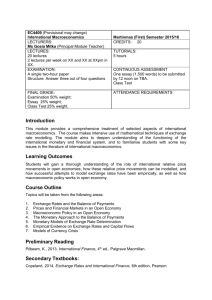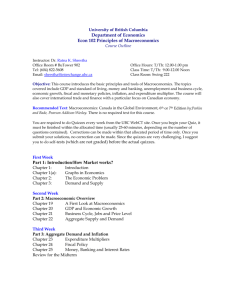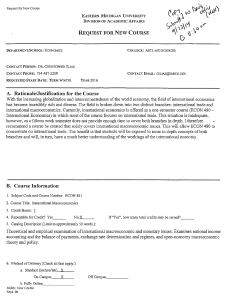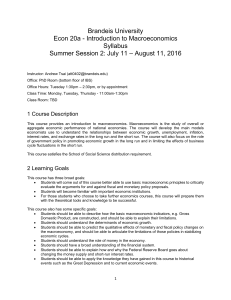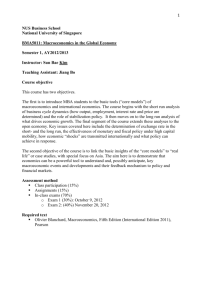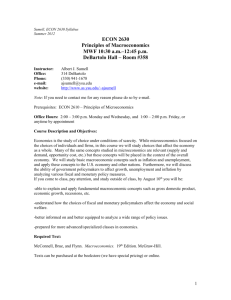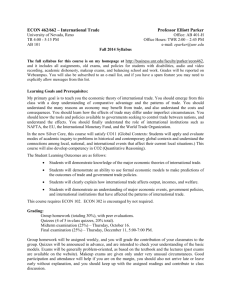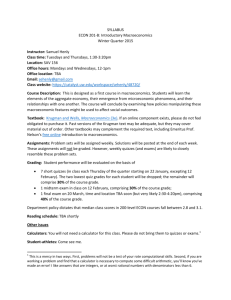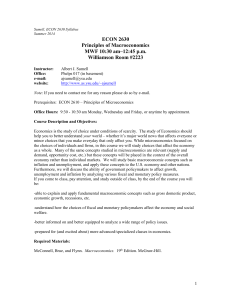ECON 463/663 – International Monetary Relations Professor Elliott Parker
advertisement
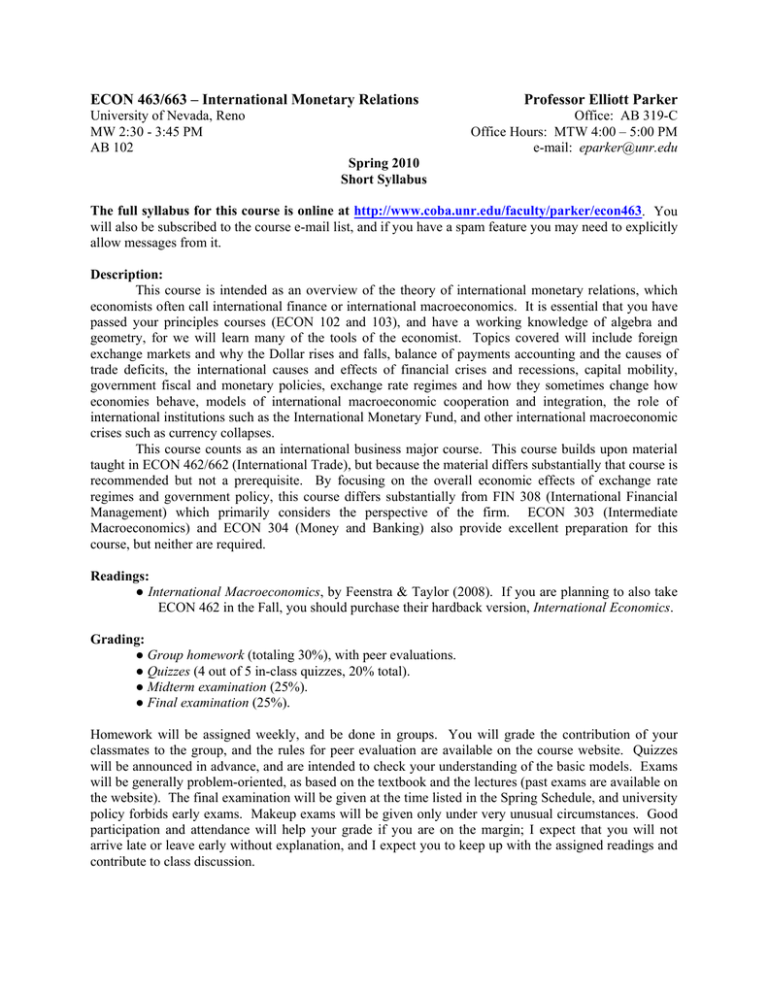
ECON 463/663 – International Monetary Relations University of Nevada, Reno MW 2:30 - 3:45 PM AB 102 Professor Elliott Parker Office: AB 319-C Office Hours: MTW 4:00 – 5:00 PM e-mail: eparker@unr.edu Spring 2010 Short Syllabus The full syllabus for this course is online at http://www.coba.unr.edu/faculty/parker/econ463. You will also be subscribed to the course e-mail list, and if you have a spam feature you may need to explicitly allow messages from it. Description: This course is intended as an overview of the theory of international monetary relations, which economists often call international finance or international macroeconomics. It is essential that you have passed your principles courses (ECON 102 and 103), and have a working knowledge of algebra and geometry, for we will learn many of the tools of the economist. Topics covered will include foreign exchange markets and why the Dollar rises and falls, balance of payments accounting and the causes of trade deficits, the international causes and effects of financial crises and recessions, capital mobility, government fiscal and monetary policies, exchange rate regimes and how they sometimes change how economies behave, models of international macroeconomic cooperation and integration, the role of international institutions such as the International Monetary Fund, and other international macroeconomic crises such as currency collapses. This course counts as an international business major course. This course builds upon material taught in ECON 462/662 (International Trade), but because the material differs substantially that course is recommended but not a prerequisite. By focusing on the overall economic effects of exchange rate regimes and government policy, this course differs substantially from FIN 308 (International Financial Management) which primarily considers the perspective of the firm. ECON 303 (Intermediate Macroeconomics) and ECON 304 (Money and Banking) also provide excellent preparation for this course, but neither are required. Readings: ● International Macroeconomics, by Feenstra & Taylor (2008). If you are planning to also take ECON 462 in the Fall, you should purchase their hardback version, International Economics. Grading: ● Group homework (totaling 30%), with peer evaluations. ● Quizzes (4 out of 5 in-class quizzes, 20% total). ● Midterm examination (25%). ● Final examination (25%). Homework will be assigned weekly, and be done in groups. You will grade the contribution of your classmates to the group, and the rules for peer evaluation are available on the course website. Quizzes will be announced in advance, and are intended to check your understanding of the basic models. Exams will be generally problem-oriented, as based on the textbook and the lectures (past exams are available on the website). The final examination will be given at the time listed in the Spring Schedule, and university policy forbids early exams. Makeup exams will be given only under very unusual circumstances. Good participation and attendance will help your grade if you are on the margin; I expect that you will not arrive late or leave early without explanation, and I expect you to keep up with the assigned readings and contribute to class discussion. ECON 463/663 Syllabus Page 2 Lecture Schedule: 1. Introduction to International Monetary Relations -- 1 week 2. Review of International Trade Theory - 2 weeks a. Comparative Advantage and the Patterns of International Trade b. The Standard Trade Model and International Factor Movements c. A Trade-based Model of Exchange Rates 3. Exchange Rate Markets - 3 weeks a. The Spot Market, the Forward Market, Futures, and Options: b. The Monetary Approach c. The Assets Approach 4. Output, Trade, and Capital Flows - 2 weeks a. National Income and Balance of Payments Accounting b. The Long-Run Budget Constraint and the Intertemporal Trade Model c. Global Capital Markets Midterm examination – scheduled for Wednesday, March 10. 5. International Macroeconomics - 3 weeks a. The IS-LM Model b. Macroeconomic Policies in a Closed Economy c. An Open Economy IS-LM-FX Model d. Macroeconomic Policy in Fixed Exchange Rate Regimes e. Macroeconomic Policy under Flexible Exchange Rates 6. International Monetary Relations - 3 weeks a. History of the International Monetary System b. Exchange Rate Crises c. International Monetary Coordination d. Optimum Currency Areas and the Euro e. The International Experience of Developing Countries f. Other Topics in International Macroeconomics Final examination firmly scheduled for Monday, May 10, from 2:15-4:15 PM Graduate Student Requirements: To receive graduate credit for this course, significant additional work is required. Graduate students must do additional problems on the exams, and instead of the country studies must also write a research paper. The weekly group homework will count for 25% of the grade, the midterm will count for 20% of the grade, the final will count for 25%, and the research paper will count for 30%. Quizzes will not be graded, though graduate students may take them for feedback. Any deviation to these weights must be negotiated with the professor by the beginning of the second week. Paper requirements are explained online. All Other Policies: See the Website.
